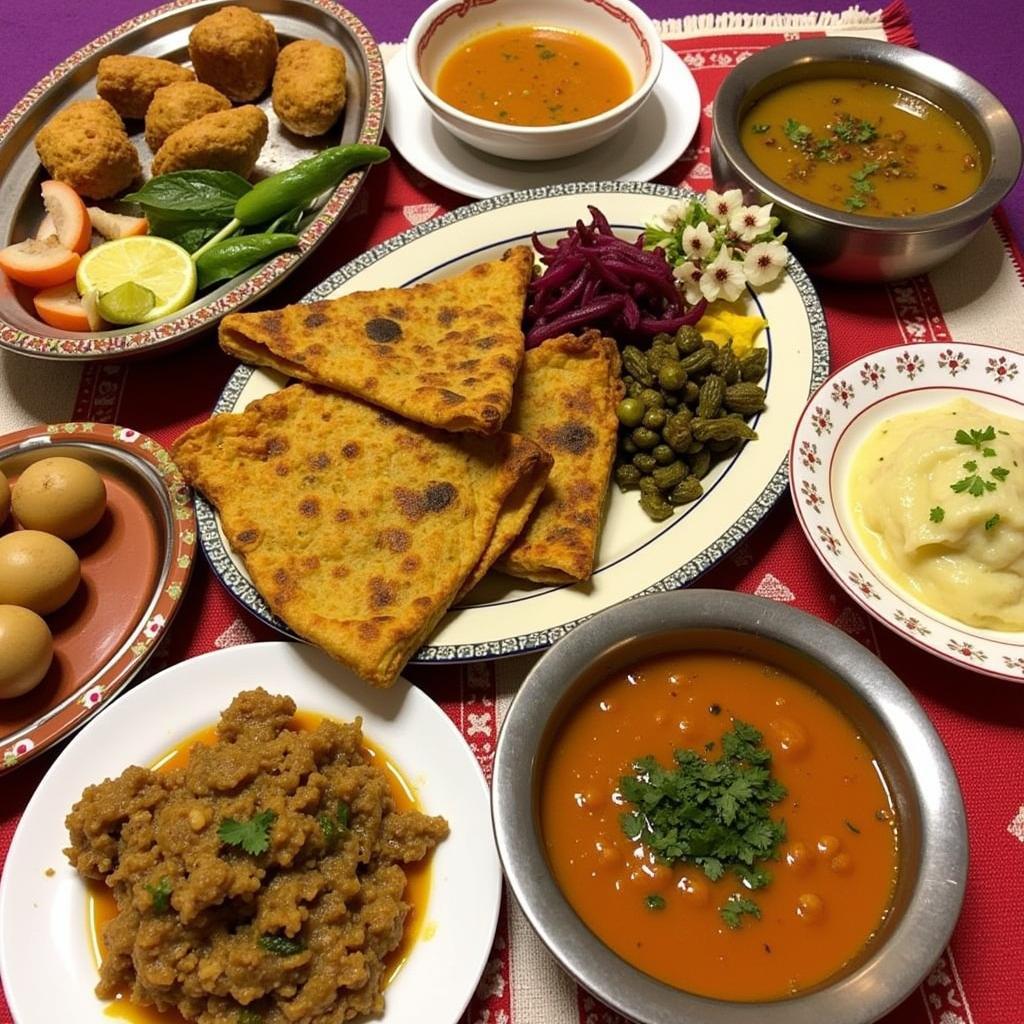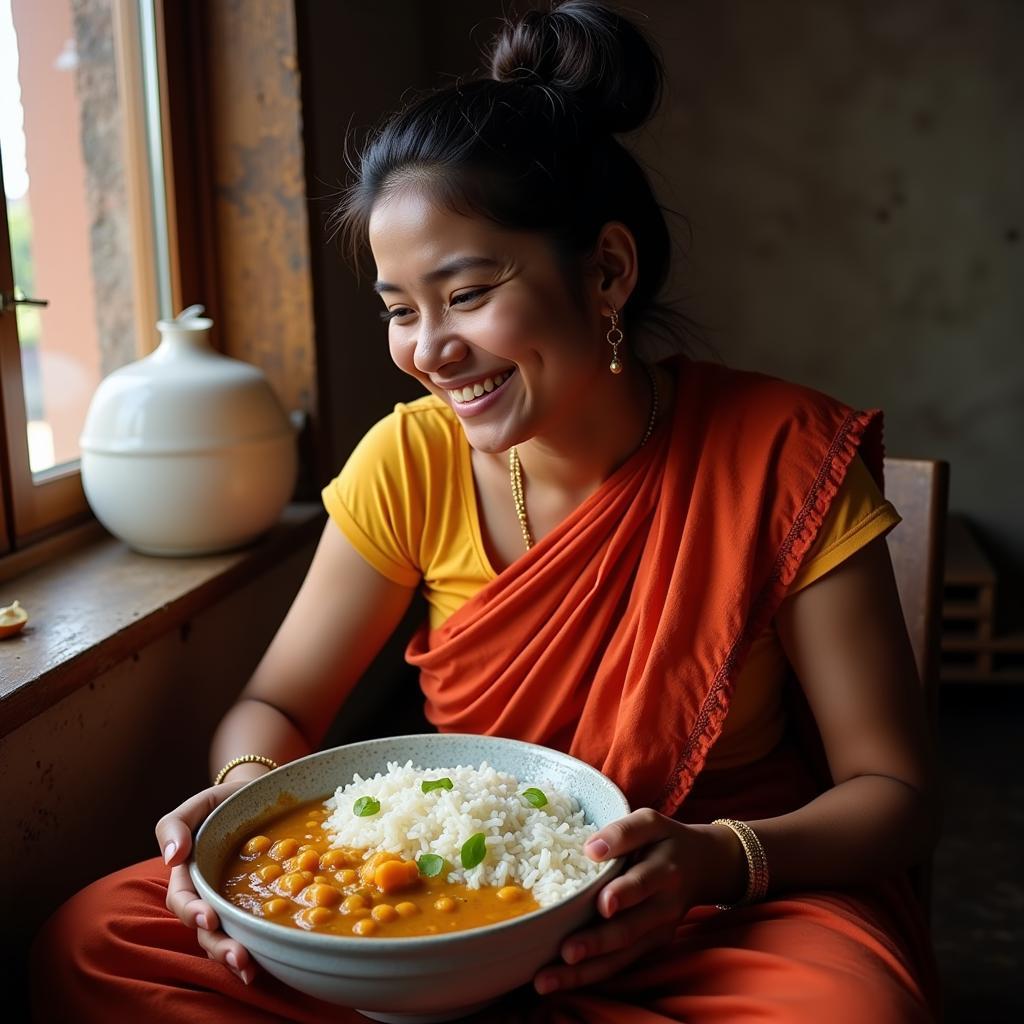After giving birth, new mothers in Indian culture are often showered with love, support, and of course, delicious food. This tradition stems from the belief that specific foods can aid in postpartum recovery, boost milk supply, and restore the mother’s energy levels. Whether you’re a new mom yourself or simply curious about these culinary customs, join us as we delve into the world of traditional Indian postpartum food.
What to Expect: A Glimpse into Postpartum Food Traditions
 A table laden with a variety of colorful and aromatic Indian dishes traditionally served after childbirth.
A table laden with a variety of colorful and aromatic Indian dishes traditionally served after childbirth.
In many Indian households, the arrival of a newborn ushers in a period of dedicated care for the new mother. This often involves a special diet tailored to her needs, prepared with love by mothers, grandmothers, or other female relatives. These meals are not just about sustenance; they are steeped in tradition and packed with ingredients believed to possess healing properties.
Key Ingredients and Their Benefits
The foundation of Indian postpartum food lies in the careful selection of ingredients known for their nutritional value and restorative qualities:
- Ghee (Clarified Butter): Rich in healthy fats, aids digestion, and lubricates joints.
- Jaggery (Unrefined Sugar): A natural source of iron and energy, helps increase hemoglobin levels.
- Fenugreek Seeds (Methi): Believed to stimulate milk production and provide relief from postpartum aches.
- Carom Seeds (Ajwain): Known for its digestive properties and ability to reduce bloating.
- Sesame Seeds (Til): A good source of calcium, essential for both mother and baby.
- Nuts and Dried Fruits: Provide essential vitamins, minerals, and healthy fats.
Popular Postpartum Dishes Across India
 An Indian mother sits comfortably, enjoying a bowl of nourishing postpartum food.
An Indian mother sits comfortably, enjoying a bowl of nourishing postpartum food.
While specific dishes vary across regions and communities, some staples remain common:
- Panjiri: A warming mixture of roasted whole wheat flour, ghee, nuts, and herbs.
- Gond Ladoo: Sweet balls made with edible gum (gond), nuts, and jaggery, known to provide energy and improve lactation.
- Herbal Soups and Concoctions: These often include ingredients like cumin, carom seeds, and fennel, which aid digestion and reduce gas.
- Dal (Lentils) and Rice: Easily digestible and rich in protein and fiber, these are staples in many Indian households.
- Green Vegetables: Leafy greens and other vegetables are incorporated for their vitamins and minerals.
Adapting to Modern Lifestyles
While traditional practices remain strong, modern Indian mothers are finding ways to adapt these customs to their lifestyles. Ready-made mixes for panjiri and ladoo are readily available, and some families opt for professional cooks specializing in postpartum meals.
“It’s heartwarming to see how traditions are evolving,” says Dr. Anjali Sharma, a renowned gynecologist in Mumbai. “The core focus on nourishing the mother remains, with modern adaptations making it more practical.”
Beyond the Plate: The Importance of Rest and Support
 A family gathers around a new mother, offering support and assistance.
A family gathers around a new mother, offering support and assistance.
While food plays a vital role, it’s crucial to remember that postpartum care extends beyond the plate. Adequate rest, emotional support from loved ones, and assistance with newborn care are equally important for the mother’s well-being.
Conclusion: Nurturing Body and Soul
The tradition of postpartum food in India beautifully exemplifies the deep-rooted emphasis on caring for new mothers. These practices, passed down through generations, are a testament to the understanding that nourishing the body is intrinsically linked to nurturing the soul. As we celebrate these customs, let’s remember the importance of providing holistic support to new mothers, ensuring their journey into motherhood is met with love, care, and nourishment in all its forms.
FAQs
1. How long should a new mother follow a special diet after delivery?
Traditionally, this period can range from 40 days to six months. However, it’s best to consult with a healthcare professional for personalized advice.
2. Are there any foods to avoid during this time?
Spicy, fried, and processed foods are generally discouraged. Additionally, some mothers might have specific dietary restrictions based on their health or cultural beliefs.
3. Can I adapt these recipes to suit my dietary needs or preferences?
Absolutely! Many traditional recipes can be modified to accommodate dietary restrictions or preferences. Consult with a nutritionist for guidance.
4. Where can I find reliable recipes for Indian postpartum dishes?
Numerous online resources and cookbooks offer authentic recipes. Additionally, seeking guidance from elder family members can provide valuable insights.
5. What are some other ways to support a new mother beyond providing food?
Offering help with household chores, childcare, and emotional support can be incredibly valuable.
Need More Information?
For personalized guidance and support on your postpartum journey, reach out to our team at Mina Cones Food. We’re here to answer your questions and provide resources.
Contact us at:
Phone: 02437655121
Email: minacones@gmail.com
Address: 3PGH+8R9, ĐT70A, thôn Trung, Bắc Từ Liêm, Hà Nội, Việt Nam.
Our dedicated customer support team is available 24/7 to assist you.